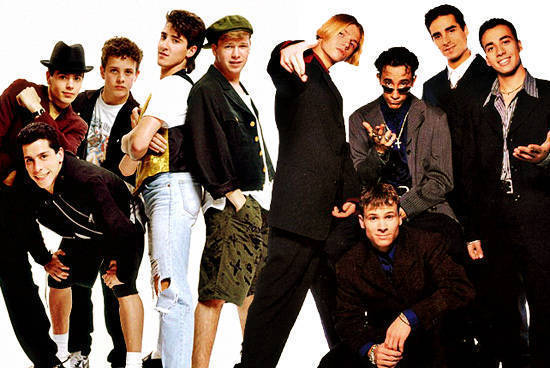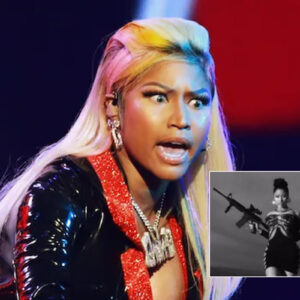Released in Europe in 1996, Backstreet Boys’ self-titled debut album solidified the iconic pop group as global stars and pivoted pop music into its prime. An international chart-topper, the album created the formula for boy bands as we know them today

There are a few specific motifs that come to mind when reminiscing about the ’90s: grunge, Spice Girls and, of course, boy bands. While the inception of boy bands had come long before the era, bringing along electric fandoms decades before, the ’90s were really the first time when the boy band craze peaked. The first ones to lead the charge? Backstreet Boys.
At a time when there was a gap in mass-market bands catering to teens, the music of Backstreet Boys, referred to as simply BSB by loving fans, was somewhat of an experiment. Just as the grunge scene was phasing out, the group ushered in a new era of radio-friendly pop that would span from Hanson to Britney Spears—except Backstreet Boys initially did it from overseas.
Formed in Orlando by the late record producer Lou Pearlman, Backstreet Boys emerged in 1993 and began working on their self-titled debut album in Stockholm two years later. Helmed by then-rising producer Max Martin, Backstreet Boys helped turn the fresh-faced newcomers, who were just between the ages of 15 and 24 at the time, into megastars nearly overnight. It wasn’t long until fans felt like they knew BSB’s Nick Carter, Brian Littrell, AJ McLean, Howie Dorough and Kevin Richardson.
In 1996, the group released Backstreet Boys in Europe, where it became an international chart-topper across the continent as well as in Asia.

U.S. audiences, though, primarily recognize Backstreet Boys’ second eponymous album, released in 1997, as their true debut. Still, it was the internationally released Backstreet Boys, which shared a handful of tracks with the U.S.-only version of the album, that made them global stars before they even shared their music stateside.
“As little kids growing up, you always hope to have success in your home country,” Dorough told Billboard in 2017. “That’s where your pride is, you know? It was so crazy how it happened everywhere else first. I think it was meant to be that way, looking back on it. It really seasoned us to come back home, to really be ready for America.” The U.S., a market the group once referred to as “No Fan Land,” would eventually catch BSB fever.
In retrospect, Backstreet Boys’ 1996 release was truly for diehard fans. Known as “The Red Album” due to its cover backdrop, Backstreet Boys marked the beginning of a new era in pop, one which channeled the R&B guy group success of Boyz II Men with the heartthrob sensationalism of New Kids on the Block. The album cover, now a pop culture relic, is representative of the ’90s boy band aesthetic: an intense glare paired with attitude, a monochromatic wardrobe, a mushroom cut and the look of five boys who are about to break a million hearts. (The flashy counterpart of the 1997 U.S. album featured a brooding quintet in oversized button-downs against a grey wall on its cover art.)
It’s fair to say that Backstreet Boys’ self-titled album became a blueprint for the cohort of boy bands to come. The group’s debut single, “We’ve Got It Goin’ On,” was responsible for the initial allure of what a modern boy band should be. The confident, Euro-pop-driven track solidified their infectious harmonizing skills and proved they had an edge that channeled NKOTB. It wasn’t long until it skyrocketed into the Top 10 in Europe.
The R&B-tinged, Boyz II Men-esque ballad, “I’ll Never Break Your Heart,” followed, showcasing BSB’s versatility as crooners. While it was their fourth single in Europe, the uptempo ballad “Quit Playing Games (with My Heart),” framed by its slick production and teen-dream aesthetic, hit No.1 on the European Hot 100. Its overwhelming praise would help it become the second single from the group’s stateside debut.
According to the band, though, the single was “an afterthought.” “It was like the last one we had done and they were like, ‘Okay guys, we think this may be a good song, let’s try it,'” Richardson told Billboard.
Originally, Richardson and Littrell had recorded “Quit Playing Games (with My Heart)” themselves, he recalls. “Then the label heard it and wanted it on the record,” he added. “Nick wasn’t even on the song at all until they wanted it to be a single.” To this day, it remains one of the songs that solidified BSB as not only a boy band, but as hitmakers.
The overwhelming success of Backstreet Boys initially seemed revolutionary—to both the group and to music fans—and pivoted pop music into its prime. Still, BSB weren’t exactly warmed up to the “boy band” label initially. “We always wanted just to be considered a vocal harmony group,” Dorough told Billboard.
The album’s breakout would also go on to spark one of the music industry’s most notorious rivalries. BSB initially believed they were a singular force. Little did they know that Pearlman, the group’s founder and label CEO, also signed the band that would become their biggest competition: *NSYNC. While fans fueled the rivalry, it didn’t help that Pearlman had effectively cloned the band.
In the Backstreet Boys’ 2015 documentary, Show ‘Em What You’re Made Of, Richardson recalls Pearlman showing him a recording of *NSYNC’s talents; he called it a “betrayal.” “When we started out, we were like, ‘Yeah, we’re a team. We’re gonna take over the world. There’s nobody like us,'” Richardson said in the film. “Then you find out, ‘Well, actually, there is somebody like you.'”

In 1998, Johnny Wright, who managed *NSYNC and Backstreet Boys, told Rolling Stone his plan was “to turn Orlando into the next Motown, but we were going to call it Snowtown – because we weren’t doing it with R&B acts, we were doing it with pop acts.” While the five-piece was less than thrilled, the creation of both BSB and *NSYNC would forever alter pop music.
Soon enough, more boy bands emerged, namely 98 Degrees and O-Town. While BSB and *NSYNC undoubtedly paved the way for more recent boy bands like One Direction, 5 Seconds of Summer and PRETTYMUCH, there’s been no boy band rivalry to match since.
Although its release was initially limited, Backstreet Boys laid the foundation and created the formula for boy bands as we know them today, from sound and style to the dedicated fandoms that have flourished in the years since. Without the success of the band’s self-titled album, it’s possible the boy band craze could have been an ephemeral phase or even nonexistent. Pop fans, whether they were team Nick Carter or Justin Timberlake, owe it all to Backstreet Boys.
News
Test đẩy bài từ cms
Test đẩy bài từ cms, xóa sau khi dùng.
When Nicki Minaj Was Accused Of Being Part Of Bloods Gang
When Nicki Minaj Was Accused Of Being Part Of Bloods Gang & Hired Gangsters To Threaten Her Husband’s Accuser In $20 Million Lawsuit The lawyer accused Niski…
Hailey Bieber Finally Breaks Silence On Alleged Marriage Trouble With Justin Bieber
Hailey Bieber Finally Breaks Silence On Alleged Marriage Trouble With Justin Bieber: “The Constant Blind Items I See On TikTok…” Stephen Baldwin has sparked divorce rumors since…
Kristen Stewart Once Called Out The Unrealistic Intimate Scenes In Twilight
Kristen Stewart Once Called Out The Unrealistic Intimate Scenes In Twilight: “How Do We Live Up To That?” Kristen Stewart opened up about how agonising it was…
Kristen Stewart says she ‘felt turned on’ by new film Love Lies Bleeding featuring lesbian s:e:x scenes that will ‘shock people’
Kristen Stewart says she ‘felt turned on’ by new film Love Lies Bleeding featuring lesbian s:e:x scenes that will ‘shock people’ – and she’s showcases a skimpy…
Kim Kardashian’s ‘lumpy’ skin exposed in unedited snap as fans left gobsmacked
Kim Kardashian’s ‘lumpy’ skin exposed in unedited snap as fans left gobsmacked Kim Kardashian has left fans gobsmacked after seeing her real skin up close and personal…
End of content
No more pages to load










